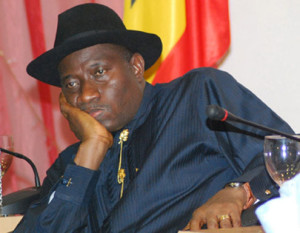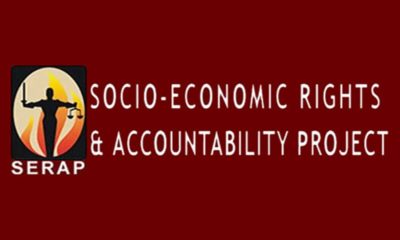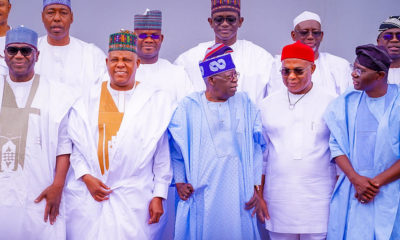Finance
$20bn oil money reunites Nigeria’s Governors against Jonathan’s Govt

ABUJA—NIGERIA’S 35 governors, cutting across different political divides yesterday, put aside the two-year feud that has factionalised their umbrella body, Nigeria Governors Forum, NGF, to demand an account of the estimated $20 billion they claimed accrued to the Excess Crude Account, ECA, while the NGF crisis lasted.
The demand which was directed at outgoing President Jonathan’s Minister for
Finance, Dr. Ngozi Okonjo-Iweala, was immediately rebuffed by the minister, who asked the governors to seek clarification from their finance commissioners. Reflective of their new unity, the governors by consensus, adopted Governor Abdulaziz Yari of Zamfara State as the new chairman of the NGF to take over from Governor Rotimi Amaechi, who presided at the session.
Governor Jonah Jang of Plateau State, who had claimed chairman of the other faction of the NGF, was absent at the meeting that was, however, attended by several members of his faction. Rising from the meeting which commenced late on Monday and ended in the wee hours of yesterday, the governors urged the minister to explain the circumstances surrounding the money that accrued to the ECA between June 2013 and April 2015.
Reading a communiqué at the end of the meeting which started 9 pm and ended 1am, the outgoing chairman, Governor Amaechi announced that Governor Yari was adopted as chairman of the body to serve for one year from May 2015 to May 2016.
The meeting which took place at the Lagos/ Osun Hall of Transcorp Hilton, Abuja, also approved the establishment of a Governors’ Forum Academy to be tagged the NGF Leadership Academy that would be responsible for capacity building of governors and other officials holding public office and to be overseen by the secretariat of NGF. According to the governors, there would be an induction course for new and returning governors in June, 2015 aimed at equipping them with knowledge of global best practices in the running of their offices.
The governors, who congratulated the President-Elect, Muhammadu Buhari on his election also hailed President Goodluck Jonathan for his statesmanship in accepting the outcome of the elections. The communiqué read thus: “We are hereby reconciled and reunited as a single umbrella association of the 36 state governors of Nigeria regardless of party or region.
“Forum congratulates the President-elect, Muhammadu Buhari on his victory in the recent presidential election which held on March 28, 2015 and President Goodluck Jonathan for his statesmanship in accepting the outcome of the elections.
“In light of the fact that funds in the Excess Crude were disbursed in May 2013, there is need for the Minister of Finance and Coordinating Minister of the Economy, Dr. Ngozi Okonjo-Iweala to provide explanation for accruals to this account from June 2013 to April 2015 which is estimated at over$20 billion.” Governors’ statement totally strange – Okonjo-Iweala Responding, yesterday, through her special adviser Mr. Paul Nwabuikwu, the minister said that issues about the ECA was discussed at the monthly meetings of the Federation Account Allocation Committee, FAAC, attended by state commissioners of finance.
Minister of Finance and Coordinating Minister of the Economy, Dr. Ngozi Okonjo-Iweala She said: “It has come to our attention that governors under the aegis of the Nigeria Governors Forum have requested that the Coordinating Minister for the Economy and Minister of Finance should account for an estimated $20 billion oil revenue from the Excess Crude Account (ECA) from June 2013 to April 2015. There is no basis for the demand and the stated amount. “The statement by the governors is totally strange because FAAC meets every month, and the ECA is discussed at every session with all the state commissioners of finance present. Nothing is hidden.
At these meetings, the Honourable Minister of State, who is the Chairman of FAAC, announces the balance in the ECA, which is then discussed. So, governors who want any information about the ECA, should ask for details from their commissioners who should have the records of what was discussed and agreed upon.
Details of the ECA are also published every month along with the allocations to the three tiers of government. “The reference to June 2013 in the statement is probably because the National Economic Council last met in May 2013. But this is immaterial because the FAAC meetings during which the ECA and similar issues are discussed have generally held regularly every month.
Banking
CBN Denies Currency Devaluation

The Central Bank of Nigeria (CBN) has refuted claims of devaluing the.
Earlier reports suggested that the CBN had devalued the Naira, lowering its exchange rate from N631 to the dollar, compared to the previous day’s rate of N461.60 at the Importers and Exporters (I&E) window.
However, the Central Bank of Nigeria (CBN) released a statement on Thursday through its Acting Head of Corporate Communications, Dr. Isa Abdulmumin, categorizing the report as false information.
In the statement titled ‘CBN Has Not Devalued The Naira’, he said the attention of the apex bank was drawn to the news report by an Abuja based newspaper edition of June 1, 2023, titled “CB Devalues Naira To 630/51”.
However, the CBN stated categorically that the news report was replete with outright FALSEHOODS and destabilizing innuendos, ‘reflecting potentially willful ignorance of the said medium as to the workings of the Nigerian Foreign Exchange Market.’
“For the avoidance of doubt, the exchange rate at the Investors’ & Exporters (I&E) window traded this morning (June 1, 2023) at N465/USS1 and has been stable around this rate for a while.
“The public is hereby advised to ignore the news report by Daily Trust in its entirety, as it is speculative and calculated at causing panic in the market,” the CBN spokesman added.
He, therefore, advised media practitioners to verify their facts from the Central Bank of Nigeria before publishing in order not to misinform the public.
Banking
BREAKING: CBN Increases Interest Rate By 0.5%

The interest rate in Nigeria has been raised to 18.5 percent, up by 0.5 percent, from 18 percent where it was pegged in March 2023.
The Central Banks of Nigeria’s (CBN) Monetary Policy Committee (MPC) resolved to this effect at its third meeting of 2023 in Abuja, on Wednesday.
Governor, CBN, Godwin Emefiele, made the disclosure in the communiqué of the MPC’s meeting, thereafter.
While engaging the media at the end of the two-day meeting, Emefiele, said the committee voted to keep the asymmetric corridor at +100 and -700 basis points around the MPR.
In the view of the MPC, rising inflation rate is traceable to the high energy cost and challenges around the supply chain, among others, which lie outside the corridors of the CBN.
Emefiele said, “The current trend in price development would continue to be monitored by the bank with greater collaboration with fiscal authority to address the drivers of inflation.”
Biztellers reports that the CBN had effected six consecutive interest rate increases, which has seen the rate move from 11.5 percent in March 2022 to 18.5 percent in May 2023.
Finance
Dangers Lurk As Nigerians Resort To Refurbished Gas Cylinders

In Nigeria, people have been forced to come up with creative solutions to cope with the effects of inflation and the economic crisis.
These improvised strategies have not only helped individuals save money, but also enabled them to stay afloat during difficult times.
In a concerning development, the recent trend of boycotting the high cost of cooking gas cylinders in Nigeria may pose a greater risk to lives than it does in terms of saving money.
Economy&Lifestyle investigations have revealed that the soaring prices of gas cylinders have reached a point where it has become increasingly challenging for average households to afford them, let alone refill them with gas.
The situation is further exacerbated by the fact that the pump price of kerosene, which would typically serve as an alternative, has become prohibitively expensive.
Upon investigation, it was found that the prices of gas cylinders vary depending on their sizes. A 3kg gas cylinder is priced at N14,000, while a 5kg cylinder costs N16,000. The larger cylinders are even more costly, with a 6kg cylinder priced at N17,000 and a 12.5kg cylinder costing N19,000.
Additionally, the expense continues when it comes to filling these cylinders with cooking gas, as it costs N2,600 for a 3kg cylinder, N5,200 for a 6kg cylinder, N8,950 for a 10.5kg cylinder, and N10,650 for a 12.5kg cylinder.
Consequently, an average household that needs to replace a worn-out 5kg cylinder would have to come up with N20,250 to purchase a new cylinder and fill it with gas, which can be a difficult feat to achieve.
As a result, many people have resorted to refurbishing their old cylinders and trying to use them as best as they can. However, this approach poses a significant danger.
Mrs. Rukayat Adesoji, a trader, shared her experience regarding her gas cylinder, which had become rusted and could no longer stand upright since last month. Due to the exorbitant prices of purchasing new cylinders, she resorted to seeking the assistance of a welder.
The welder patched the legs of the cylinder, repainted it, and ever since then, she has been using the refurbished cylinder for her cooking needs.
She said ““My gas cylinder which was 6kg got rusted and no longer stands erect since last month. When I asked for the price, I was told it was N17, 500. I was discussing it with a friend who advised me to take it to a welder to paint it and construct a new stand. I heeded to her advice and at the end spent just N3, 000 to turn my cooking gas to a brand new.”
Apart from refurbishing cylinders, some people don’t even know when their cylinders will expire. Mrs. Mercy Opara, a hair stylist, falls in that category as she explained: “I am taking my gas cylinder to the welder to spray it for me. It just cost N1, 500.
“The cost of buying a new cylinder is high. I have been using my cylinder for over 7 years and I don’t even know the expiry date. I just pray God blesses me so that I can buy a new one. But this one I am managing will look neat after spraying it for another two years.”
Mr. Adekanbi Joseph, a wielder, said he paints cylinder and “To paint and rebuild a cylinder stand, I charge N4, 500. Many people come here to paint as a new cylinder is now very expensive to get.”
Highlighting the potential dangers of using refurbished cylinders, Mr. Benjamin Hope, the Chief Executive Officer of FKT Cooking gas and general goods, emphasized the risks involved.
He stated that even a brand new cylinder can pose a risk of explosion if the locks are not properly secured after use or if the cylinder filled with gas is moved from one location to another.
He said “A brand new cylinder can explode if the locks are not well keyed after using and if the cylinder filled with gas was moved from one place.
“There are many reasons for the high cost of gas cylinders in Nigeria. One is the cost of importation due to the exchange rate. Another is the increased migration from the use of kerosene to cooking gas which has necessitated increased demand for gas cylinders. You know that in such a case there will be increased importation of cylinders.”he added

















